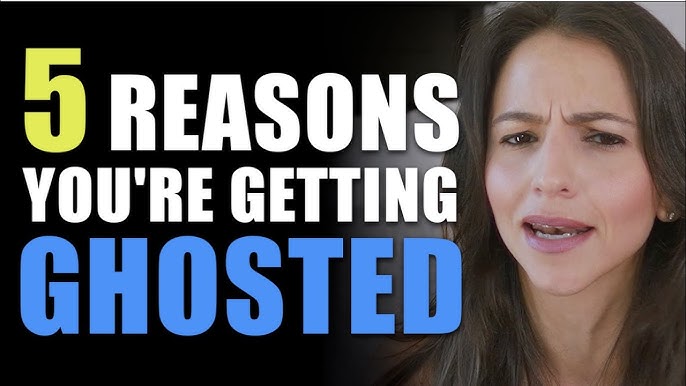What to Do When You’ve Been Ghosted: A Complete Survival Guide
Ghosting is a term that has become very familiar in the dating world. It refers to the sudden disappearance of someone you are dating or communicating with, without any explanation or warning. One day you’re chatting or spending time together, and the next, they disappear – leaving you to wonder what went wrong. Ghosting can be painful and confusing, but it’s important to know how to handle it effectively. In this guide, we’ll explore what ghosting is, why it happens, and, most importantly, how to deal with it.
What is ghosting?
Ghosting is when someone you’ve been dating or getting to know suddenly cuts off all communication without explanation. This can happen after a few dates or even after weeks or months of dating. Sudden silence can be unsettling, leading to feelings of rejection, confusion, and frustration.
Why do people ghost?
Understanding why people ghost can help you better manage your emotions and reactions. Here are some common reasons why one might choose a ghost:
Fear of confrontation: Some people avoid uncomfortable conversations. Instead of explaining why they are no longer interested, they choose to disappear.
Loss of interest: The person may have lost interest in the relationship but doesn’t know how to express it clearly.
Busy or overwhelmed: Life stresses—work, family, personal issues—can cause someone to withdraw without explanation.
Meeting someone new: They may have started dating someone else and decided to end the relationship with you.
Immaturity: Ghosting is often seen as an immature way of handling relationships. It shows a lack of emotional intelligence and empathy.
Not ready for commitment: The person may realize that they are not ready for a serious relationship and opt out.
The emotional impact of ghosting
Ghosting can lead to a number of negative emotions, including:
Confusion: Wondering why the person disappeared.
Self-doubt: Questioning if you’ve done something wrong.
Frustration: Feeling angry at not having closure.
Sadness: Your connection is missing.
Realizing that these feelings are normal can help you move through them more constructively. The first step in dealing with ghosting is acknowledging and accepting your feelings.

How to Handle Ghosting
Dealing with ghosts is a difficult task, but there are several steps you can take to manage it in a healthy and positive way:
Acknowledge your feelings
It is important to recognize the feelings that arise when someone ghosts you. Whether it’s anger, confusion, or sadness, acknowledge those feelings. Allow yourself to feel without judgment. Write down your thoughts or talk to a trusted friend about what you’re feeling. Bottling up feelings can lead to unresolved feelings and future relationship problems.
Don’t take it personally
Ghosting often reflects more on the person doing the ghosting than on you. Their inability to communicate effectively is not a reflection of your value or worth. Instead of internalizing their actions, remind yourself that ghosting is a sign of their immaturity or emotional unavailability. This understanding can help you distance yourself from the blame.
Resist the urge to chase
When someone disappears without explanation, the natural reaction may be to reach out and ask for an explanation. However, chasing someone who has ghosted you can lead to more frustration and pain. If they chose to leave without a word, it’s unlikely that finding them would provide any closure. Give yourself the gift of peace by trying to move on without trying to get answers from someone who isn’t willing to give them.
Focus on self-care
Taking care of yourself is very important when dealing with the emotional effects of exorcism. Engage in activities that bring you joy and relief. This could be exercise, journaling, spending time with friends and family, or finding hobbies that make you feel good. Make self-care a priority and give yourself time to heal.
Learn from experience
Every dating experience, even a negative one, provides an opportunity to learn and grow. Reflect on the relationship and consider what you learned about yourself, your needs, and your boundaries. Did you see any red flags that you ignored? Did you have expectations that weren’t discussed? Use this as an opportunity to become more self-aware and prepare for a healthy future relationship.
Set healthy boundaries
Ghosting often occurs when boundaries are not clearly established. In future relationships, set boundaries as early as possible. Know that open communication is important to you. It won’t necessarily prevent ghosting, but it sets a standard for the kind of relationship you want and deserve.
Don’t jump to conclusions
It’s easy to assume the worst when someone ghosts you, but there may be reasons that have nothing to do with you. They may be going through a personal crisis, dealing with mental health issues, or facing other challenges. While this doesn’t excuse their lack of communication, it helps to remember that not everything is about you.
Know when to move on
Acceptance is an important step in dealing with ghosts. Realize that if someone chose to go without closure, they probably weren’t the right match for you. Holding on to what could have delayed your healing process. Moving on can be difficult, but it’s important for your emotional well-being.
Get help if needed
If you find yourself struggling with the emotional effects of exorcism, don’t hesitate to get help. This can be by talking to a therapist, joining a support group, or chatting on forums or being with understanding friends. Professional help can provide strategies for managing your emotions and help you build healthy relationships moving forward.
Be optimistic about future relationships
Being ghosted can be frustrating, but don’t let it taint your view of dating. Understand that not everyone behaves this way, and there are many people who value clear and respectful communication. Be optimistic and engage with others who share your values and perspective on relationships.
How to stop ghosting
While you can’t control someone else’s behavior, you can take steps to reduce the likelihood of ghosting:
Communicate expectations early: Be upfront about your desire for open and honest communication.
Look for red flags: Look for patterns of inconsistent communication or avoidant behavior.
Set boundaries: Tell them that disappearing without an explanation is unacceptable.
The result
Ghosting is a frustrating part of modern dating, but it doesn’t have to define your dating experience. By acknowledging your feelings, focusing on self-care, setting boundaries, and learning from experience, you can manage ghosts in a healthy way. Remember, a ghost often says more about the person than it does about you. Keep moving forward, stick to your values, and be open to genuine connections.
By taking these steps, you not only protect your emotional well-being but also prepare yourself for more fulfilling relationships in the future.
Read More: The importance of communication in long distance dating













